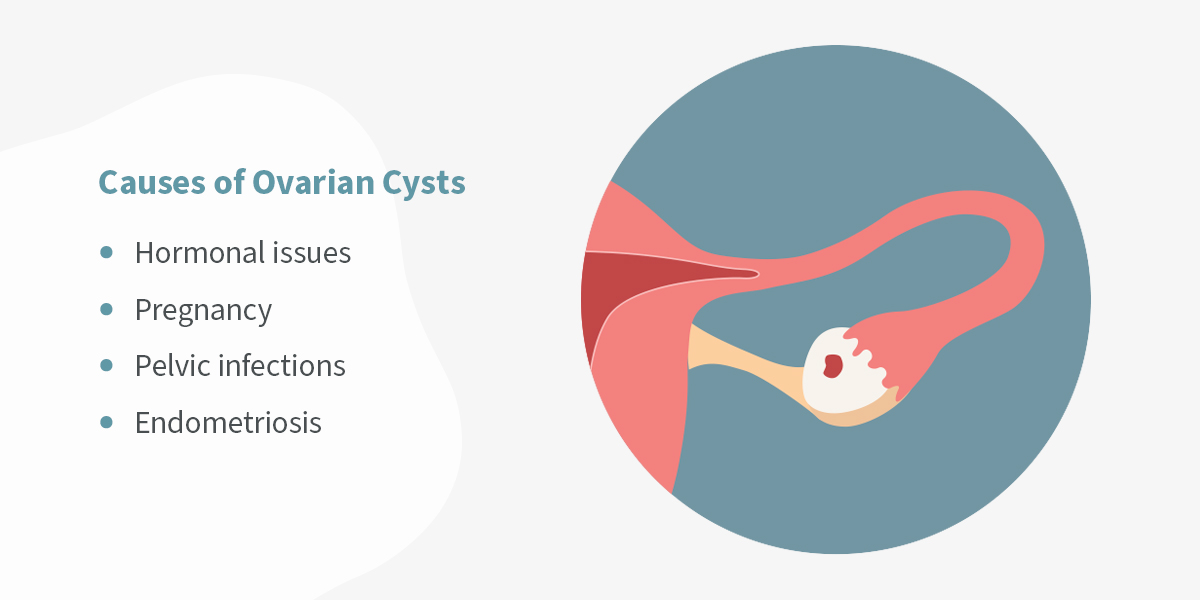Ovarian cysts are sacs of fluid or semisolid material that form inside or on the ovary. Most types are benign, unproblematic, painless and go away on their own. Most individuals don’t even know they have an ovarian cyst until they’ve received their routine pelvic exam or have an imaging procedure.
Learn more about ovarian cyst symptoms, types and any complications they could cause.
Symptoms of Ovarian Cysts
Though it’s difficult to know if you have an ovarian cyst, there are symptoms you may experience that could hint at the possibility of having one. With smaller cysts, you usually don’t have any indications you have them, but larger cysts could cause:
- Aching in your back
- Pelvic pain
- Bloating
- Pressure, heaviness or fullness in your abdomen
- Painful periods
- Pain during intercourse
If you experience severe and sudden pelvic or abdominal pain, shock, fever or vomiting due to the pain, you should seek medical attention immediately.
Causes of Ovarian Cysts
Ovarian cysts develop for various reasons. Some cysts may form due to your menstrual cycle, while others appear because of diseases or how your body produces cells. Other common causes of ovarian cysts include:
- Hormonal issues
- Pregnancy
- Pelvic infections
- Endometriosis
People of any age can develop ovarian cysts, though it is more common in individuals who have experienced puberty but have yet to reach menopause.
Ovarian Cyst Types
There are several types of ovarian cysts you could have or experience. In a regular menstrual cycle routine, a follicle, a small sac in your ovary, grows every month. The follicle creates estrogen, contributing to typical changes in the uterine lining as the uterus prepares for pregnancy, such as maturing an egg. Once the egg is mature enough, the follicle releases it during ovulation. Sometimes, however, the egg may not be released from the follicle, leading to the formation of a cyst.
This phenomenon creates functional cysts, a general category for two common kinds of ovarian cysts. Functional cysts aren’t due to diseases and often shrink over time without treatment. The two types of functional ovarian cysts are:
- Corpus luteum: Corpus luteum cysts occur when the follicle discharges an egg and forms a group of cells, the corpus luteum, that produces hormones. The cyst develops when fluid fills the corpus luteum, making it grow.
- Follicular: A follicular cyst develops when the follicle doesn’t release an egg like it should every month and instead grows as it gets filled with fluid.
Besides functional cysts, other types of ovarian cysts form unrelated to menstrual cycles. While most aren’t related to diseases, doctors may pay close attention if you have any of the following cysts to ensure they don’t lead to any health complications. Other ovarian cysts include:
- Dermoid: Dermoid cysts, or teratomas, form from cells of different types of body tissue. Some dermoid cysts may have cells from hair, teeth, skin and brain tissue.
- Cystadenomas: Ovarian cystadenomas grow on the surface of the ovaries. They could be full of mucous or watery material and can grow very large.
- Endometriomas: An ovarian endometrioma is a cyst that develops and gets filled with endometrial tissue, which is what is shed each month during the menstrual cycle. If you have an endometrioma cyst, you may have endometriosis, which causes tissue similar to the lining of the uterus to grow outside of the uterus. Only individuals with endometriosis can get endometrioma ovarian cysts.
- Ovarian cancer: Ovarian cancer tumors are another kind of cyst. Unlike the others, which contain liquid or semisolid materials, ovarian cancer cysts have solid masses of cancer cells.
Depending on the cyst type and condition, you may need to undergo surgery to have the cyst removed. For example, common cysts that individuals get removed include endometriomas and ovarian cancer cysts. Another way to treat ovarian cysts is through medication. Your doctor may prescribe birth control or other hormone medication to prevent future cysts from growing.
Potential Complications From Ovarian Cysts
Though ovarian cysts are generally harmless and resolve with time, some complications could occur in rare cases. A couple of potential complications from ovarian cysts include:
- Ovarian torsion: Some cysts grow and become large enough to move the ovary. If the ovary twists, you’re experiencing ovarian torsion. With this condition, you may suddenly feel nauseous, vomit or have severe pelvic pain. Ovarian torsion could also stop or reduce blood flow to your ovaries.
- Ruptured cysts: If an ovarian cyst bursts open, you have a ruptured cyst — and this causes severe pain. They also cause bleeding in the pelvis. Larger cysts are more likely to rupture. It could happen after vigorous activity, like strenuous exercise or vaginal intercourse.
- Cancerous cysts: A cancerous cyst will make your body weak and cause other health complications. They typically form after an individual has gone through menopause.
All three conditions can have concerning outcomes, so seeking medical attention immediately ensures you stay safe and can prevent further issues. Your provider will ensure you receive the best treatment plan for your situation.
Contact Hann’s Fertility Pharmacy to Learn More
Ovarian cysts don’t have to be scary. If you need ovarian cyst medication to help with yours, have your provider send it to Hann’s Fertility Pharmacy. Our pharmacists will make sure you get the right medication that your doctor prescribed. We can also answer any questions you may have about ovarian cysts — we’re always here to help.
Reach out to Hann’s Fertility Pharmacy to get started today!


